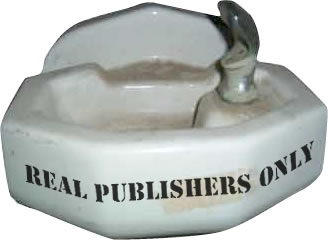 The notion of real publishing as opposed to self-publishing and the stigma surrounding it is obsolete. I have no objections to traditional publishers but every one of them started off as a “self-publisher” with a first book. I have pretty much stopped referring to myself as a “self-publisher.” I produce and market books like anyone else in the business.
The notion of real publishing as opposed to self-publishing and the stigma surrounding it is obsolete. I have no objections to traditional publishers but every one of them started off as a “self-publisher” with a first book. I have pretty much stopped referring to myself as a “self-publisher.” I produce and market books like anyone else in the business.
Real Publishing vs. Vanity Publishing: Self-publishing is often confused with so-called “vanity publishing.” If you pay someone like XLibris or iUniverse to publish you, you are not a publisher—and neither is the company that claims to be your publisher. Vanity presses take zero risk on your book. They make money producing it and they take a piece of the cover price as a royalty, double-dipping at your expense. If your so-called publisher has not made an investment in your work, they are not a real publisher. Real publishers invest in books, pay royalties when there are profits and incur losses when sales don’t match projections.
Real Publishing Means Investing in Yourself: Having a “real publisher” means someone bought your book as a development property. Technically, it’s not even your book they’re publishing. Once they buy your manuscript, it’s theirs. A serious publisher willing to pay an advance and promote a book through major retail channels is nothing to turn up your nose at; it’s an option to be carefully considered. But many writers already know how to access their book’s audience. Others appeal to niche audiences that are too small or esoteric to be meaningful to a publisher. If you think your book is a good investment and you can put it in front of interested readers by yourself, why not buy your own manuscript and be your own “real publisher?”
Real Publishing Means High Standards: Plenty of poorly edited, poorly-designed books contribute to the perception that “all self-published books are junk,” even when many big publishing houses sully the stream with their own mediocre offerings. So much effort goes into creating a book. Why not make yours excellent? Get an editor. Work with a designer. Don’t typeset your book with a word processor. Even if you can’t afford to work directly with professionals, do some research and at least get some professional opinions and direction. In life and in business, “good enough” just isn’t good enough; success is hard enough to come by without the handicap of mediocrity. Where budget limits your resources, substitute innovation, education and perseverance.
Writing is a Craft—Publishing is a Business: Split yourself into two entities—the excellent writer and the excellent publisher. Have the excellent publisher buy your excellent manuscript as an investment. Make sure the editing, typesetting and cover design are of investment quality. Start your own publishing imprint and work with a printer/distributor like LightningSource or CreateSpace. Use print-on-demand (POD) to sidestep the risks and liabilities of huge print runs and expensive bookstore returns. Buy your own ISBN numbers and own 100% of your rights and royalties. Take control of the sales commissions you are willing to pay. Develop a marketing plan and build community around your book. Be a real publisher.
Real Publishing Requires a Business plan: Neither self-publishing nor traditional publishing are “better” or more “real.” Do your research; understand the advantages and disadvantages of each approach. Part of being a professional publisher involves rejecting books that won’t sell. Be objective about whether your book is an art project or a business product. Publishing art books (fiction, memoir, etc.) is a noble undertaking but if you intend to start a successful publishing business, you may wish to write some practical nonfiction books—marketable products that can offset the expenses of producing your more personal, creative works. At very least, proceed with an understanding of the risks (as well as the important personal benefits) of publishing a book that may never recover its publishing costs. Define success in a realistic context; it comes in forms other than financial, but confusing artistic success with business success is a road to disappointment.
Writing your book is 99% of the work. Producing and promoting it is the other 99%. If you intend to be a publisher as well as a writer, be excellent at both. You can be a “self-publisher” or you can be a “real publisher;” the difference is up to you.


